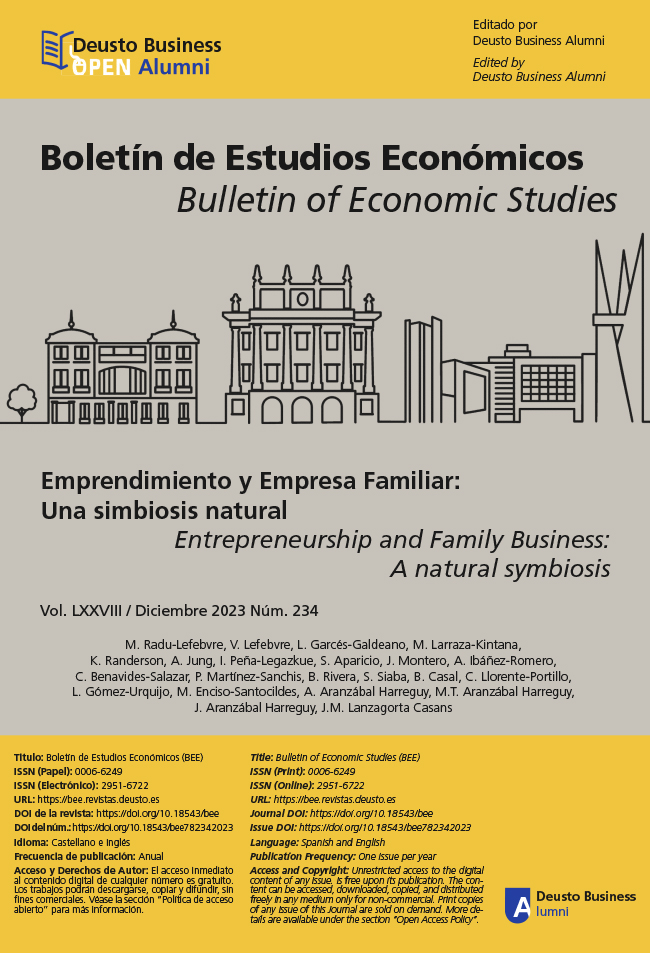Foundations, a formula for promoting roots. The case of the Antonio Aranzábal Foundation.
Abstract
The article highlights the role of foundations in establishing companies, highlighting that their contribution is crucial to the well-being and progress of society, being linked to the competitiveness of companies.
The Antonio Aranzábal Foundation (FAA), created in 1998, focuses on the development of entrepreneurs and the establishment of Basque family businesses, promoting the exchange of experiences and new governance models.
The FAA renews its founding purpose and defines strategic pillars based on contributing to the rooting of the business family, collaborating with other organizations to address challenges, and improving and retaining talent in the territory.
FAA projects include recognition of the work of the business community through the Antonio Aranzábal Award, the Case Collection, an Advanced Government Workshop for young people, and collaborations with entities such as Novia Salcedo Fundación and Rural Kutxa to attract and retain talent.
The FAA adapts its strategy to social challenges, renewing its founding purpose and focusing on multidimensional and interrelated projects to generate long-term impact.
Entrepreneurs, in addition to promoting companies, can generate roots as promoters of foundations, contributing to the link with society and the territory.
References
Bousquet, F. (2014). L’influence du lien personnel entre l’entrepreneur et le territoire sur l’ancrage territorial des PME (Doctoral dissertation, Bordeaux).
Cruz, C., & Justo, R. (2021) Perfiles de Filantropía personal en España, ie editorial, Caixabank.
Martínez-Sanchis, P., Iturrioz-Landart, C., Aragón-Amonarriz, C., Radu-Lefebvre, M., & Seaman, C. (2021). Institutional settings and local embeddedness of European entrepreneurial families: an inter-regional comparison. European Planning Studies, 29(10), 1819-1844. https://doi.org/10.1080/09654313.2021.1889474
Martínez-Sanchis, P., Aragón-Amonarriz, C., & Iturrioz-Landart, C. (2022). How does the territory impact on entrepreneurial family embeddedness?. Journal of Enterprising Communities: People and Places in the Global Economy, 16(2), 196-217. https://doi.org/10.1108/jec-09-2019-0087
Pallares-Barbera, M., Tulla, A. F., & Vera, A. (2004). Spatial loyalty and territorial embeddedness in the multi-sector clustering of the Berguedà region in Catalonia (Spain). Geoforum, 35(5), 635-649. https://doi.org/10.1016/j.geoforum.2004.03.004
Ramos, J. (2022) Mercado de trabajo vasco: proyecciones y estrategia de transición. Ponencia desarrollada en el Encuentro Protocolo de colaboración: Departamento de trabajo y empleo, Lanbide y clústeres del País Vasco, Bilbao 17/3/22.
License:
Works published in this journal are available since 2021 under the Creative Commons Attribution-NonCommercial 4.0 International license - CC BY-NC 4.0. Content prior to 2021 is not covered by the journal's current Open Access policy.
Authors' Rights:
Authors retain copyright over their work published in the Bulletin of Economic Studies and grant the Bulletin of Economic Studies non-exclusive rights to exploit the work for layout, publication, and dissemination purposes. This license allows the Bulletin of Economic Studies to distribute, reproduce, and disseminate the work on its platform and through other media, subject to the conditions outlined in this notice.
Readers' Rights:
Readers may read, download, print, search, share (copy, redistribute, or link to full text), or adapt (remix, transform, and build upon the material) the content, provided that:
- The materials are not used for commercial purposes.
- The original work is properly cited, including the name of the author and the source.
- Any modifications made to the original content are clearly indicated.
Commercial use of the materials is prohibited without the express permission of the authors. For clarity, commercial use is defined as any activity intended for financial gain or involving direct commercial exchange.
Conditions of Use:
The use of content must not infringe the rights of others or be used in a way that could damage the reputation of the author or the Bulletin of Economic Studies.
Responsibility for Content:
Authors are responsible for the content of their papers and the Bulletin of Economic Studies is not responsible for the opinions therein expressed.
More Information:
Open Access, Licensing, and Copyright Policy


.jpg)
.jpg)
.jpg)








